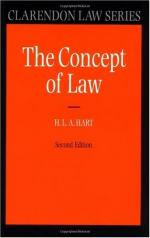
|
| Name: _________________________ | Period: ___________________ |
This test consists of 5 multiple choice questions, 5 short answer questions, and 10 short essay questions.
Multiple Choice Questions
1. What do we need to define state sovereignty?
(a) Borders and a fixed system of law.
(b) Who is creating the laws.
(c) What international laws they are subject to.
(d) What local laws they are subjected to.
2. What do rule-skepticism and formalism often do according to Hart?
(a) Co write artciles.
(b) Supplement each other.
(c) Fight each other.
(d) Contradict each other.
3. How many parts dose the idea of justice have?
(a) 3.
(b) 4.
(c) 2.
(d) 5.
4. What can be established without the voluntary cooperation of all?
(a) Coercive power.
(b) Revolutions.
(c) Democracy.
(d) Laws.
5. How many problems arise in studying international law?
(a) 3.
(b) 2.
(c) 5.
(d) 6.
Short Answer Questions
1. What are the general rules, standards and principles according to Chapter 7?
2. Why do moral codes exist?
3. What standard do we often try to employ, according to Hart?
4. What does the law need not be determined by?
5. What do people often equate to legal system?
Short Essay Questions
1. What are the two problems that arise?
2. How could the ultimate rule of recognition be recognized?
3. What does justice demand the promotion of?
4. What does Chapter 8 inquire into the relationship between?
5. What are the two parts of justice?
6. What happened when secondary rules of recognition were accepted according to Chapter 6?
7. What is there a conviction of outside the law?
8. What do positivists tend to see natural law as?
9. What does international law seem to have in Chapter 10?
10. What do many nations have under international law?
|
This section contains 554 words (approx. 2 pages at 300 words per page) |

|




